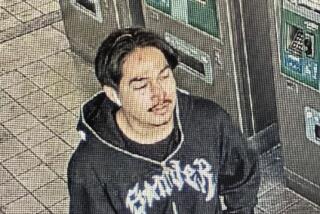A flashy funeral for ‘Great Train’ robber Ronnie Biggs
LONDON -- Ronnie Biggs, the British criminal who won worldwide fame as a member of the gang that committed the “Great Train Robbery” of 1963, was given a colorful gangster style funeral in London on Friday.
The funeral cortege accompanying a coffin covered with the flags of Britain and Brazil, where Biggs lived for years, included a motorcycle escort of black leather-clad Hells Angels, a Dixieland jazz band and flamboyantly dressed former gangsters.
A white floral wreath was fashioned in the lewd two-finger British salute of defiance to authority, the gesture used by Biggs to journalists on his last public appearance at the funeral in March of fellow train robber and mastermind of the robbery, Bruce Reynolds.
The hearse carried Biggs, who died last month at 84, to the Golders Green Crematorium.
According to media reports, Michael, the son born to Biggs in Brazil welcomed mourners and paid tribute to his father, who embraced Brazilian culture: “He spoke the lingo and enjoyed the samba.”
“He always had a soft spot for the underdog, and he considered himself to be one. He always had a few pennies for the street beggars,” said Michael, who invited mourners to “celebrate his life with a proper booze up” after the funeral service.
Biggs, who was born in Surrey, south of London, traded on his notoriety as a train robber, giving interviews and inspiring biographers and film makers while living in Brazil, out of reach of extradition laws despite the efforts of British police.
The Great Train Robbery, in which the gang cut signals and wires along the train line before uncoupling the carriages of a Glasgow-to-London mail train carrying a cargo of used bank notes, inspired books and films and even won admiration from the police at the time, who termed it a brilliantly planned operation.
Authorities arrested and convicted more than a dozen people, including Biggs, in connection with the heist, which involved millions of pounds, more than $60 million today. After a spectacular escape from a London prison in 1965, just 15 months into a 30-year jail sentence, Biggs fled the country, living first in Australia, then Brazil.
Biggs, suffering ill health, returned to Britain in 2001 and surrendered to authorities. He remained incarcerated until 2009, when the British government released him after determining that he no longer posed a threat to society. He died at a nursing home outside London.
Stobart is a news assistant in The Times’ London bureau.
More to Read
Start your day right
Sign up for Essential California for news, features and recommendations from the L.A. Times and beyond in your inbox six days a week.
You may occasionally receive promotional content from the Los Angeles Times.






